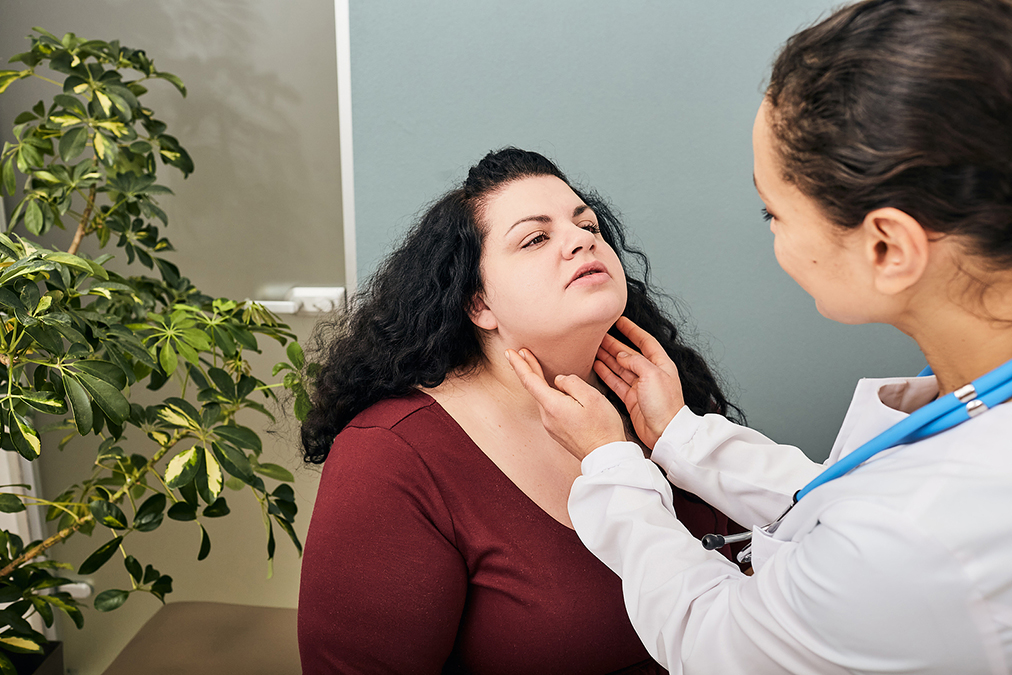 Hypothyroidism is more common in women than in men, and more common in aging women than in younger ones.
Hypothyroidism is more common in women than in men, and more common in aging women than in younger ones.
But a large Canadian study published in PLOS One found that menopause doesn’t increase your risk of developing thyroid problems.
It’s something else.
Researchers noticed something interesting: thyroid failure strikes women three to seven times more often than men, and about 70% of hypothyroidism cases are diagnosed in women over 50.
Menopause usually occurs around age 51 and brings a dramatic drop in estrogen levels.
Estrogen affects how thyroid hormones travel through your blood.
So scientists wondered: how involved is menopause really in hypothyroidism?
They decided to test its influence by looking at the timing of menopause.
If the two are strongly related, then women who go through early menopause should develop hypothyroidism earlier than those with later menopause.
They followed a large group of Canadian women whose information was collected by the Canadian Longitudinal Study on Aging, which tracked women over a 10-year period.
First, they carefully selected participants.
They started with women who had gone through natural menopause (not surgical removal of ovaries) and had never been diagnosed with thyroid problems before menopause.
They excluded anyone whose menopause occurred before age 40 or after age 67 to focus on typical menopause timing.
Their final study group included 15,330 postmenopausal women.
The researchers divided them into four groups based on menopause age: 40–44, 45–49, 50–54, and 55 or older.
Then they tracked these women for up to 10 years, observing who developed hypothyroidism and when.
They also collected detailed information about each woman’s lifestyle — including weight, education, smoking, alcohol use, exercise habits, and reproductive history.
Here’s what their investigation revealed:
-
1. Out of 15,330 women studied, 1,674 (about 11%) developed hypothyroidism during the follow-up. That’s an overall rate of 6.5 new cases per 1,000 women each year.
2. The average age at diagnosis was 60.
3. Menopause timing showed absolutely no connection to thyroid problems. Whether women went through menopause early or late made no difference.
4. Body weight told a very different story:
-
○ Women with a BMI of 25–29 had a 20% higher risk of hypothyroidism.○ Women with a BMI of 30+ had a 40% higher risk.
-
Since this study shows that weight — not menopause timing — affects hypothyroidism risk, it’s important to maintain a healthy weight through regular physical activity and balanced eating.
This is especially important after menopause, when lower estrogen slows metabolism, muscle mass declines, and most hypothyroidism cases are diagnosed.
But if you’ve already been diagnosed with hypothyroidism, you need to take all-natural steps to reverse it as soon as possible.

 Overcoming IBD
Overcoming IBD Multiple Sclerosis
Multiple Sclerosis Banishing Bronchitis
Banishing Bronchitis Gum Disease Gone
Gum Disease Gone Overcoming Onychomycosis
Overcoming Onychomycosis Neuropathy No More
Neuropathy No More The Prostate Protocol
The Prostate Protocol Brain Booster
Brain Booster
 Ironbound
Ironbound
 Solution for Shingles
Solution for Shingles
 The Bone Density Solution
The Bone Density Solution
 The Ultimate Healing Protocol
The Ultimate Healing Protocol
 The Parkinson's Protocol
The Parkinson's Protocol
 The Chronic Kidney Disease Solution
The Chronic Kidney Disease Solution
 Overthrowing Anxiety
Overthrowing Anxiety The Fatty Liver Solution
The Fatty Liver Solution The Hypothyroidism Solution
The Hypothyroidism Solution
 The End of Gout
The End of Gout The Blood Pressure Program
The Blood Pressure Program
 The Oxigized Cholesterol Strategy
The Oxigized Cholesterol Strategy
 Stop Snoring And Sleep Apnea Program
Stop Snoring And Sleep Apnea Program
 The Arthritis Strategy
The Arthritis Strategy The Vertigo & Dizziness Program
The Vertigo & Dizziness Program The 3-Step Diabetes Strategy
The 3-Step Diabetes Strategy Hemorrhoids Healing Protocol
Hemorrhoids Healing Protocol The Erectile Dysfunction Master
The Erectile Dysfunction Master Weight Loss Breeze
Weight Loss Breeze The IBS Program
The IBS Program The Insomnia Program
The Insomnia Program The Migraine and Headache Program
The Migraine and Headache Program The Neck Pain Solution
The Neck Pain Solution The Menopause Solution
The Menopause Solution The Ejaculation Master
The Ejaculation Master The TMJ Solution
The TMJ Solution The Acid Reflux Solution
The Acid Reflux Solution The Fibromyalgia Solution
The Fibromyalgia Solution The Psoriasis Strategy
The Psoriasis Strategy